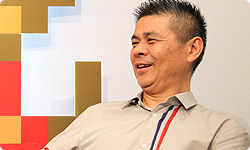12. Still Provocative 25 Years Later
Are you working on anything new? Anything you can mention?
I’m a little involved with audio guides and educational systems for public spaces with the Nintendo DS.
Oh, really? Regardless of whether they’ll sell?
Right. It’s quite enjoyable.
And it’s not just enjoyable because someone told you it’s all right if it doesn’t sell?
Right.
Isn’t that strange? (laughs)
Yeah. To be honest, I’m making the audio guide because I’m sure it’ll be a hit sometime. (laughs)
Your persistence in that way is really incredible, Miyamoto-san.
I can’t help but think about how it would be really cool if something goes over well. But it’s no good to be so calculating. I really should be more straightforward about it.
How about when you made the first Super Mario Bros.? Were you straightforward then?
Hmm…that was before I ever talked much with Mr. Hiroshi Yamauchi, who is currently our Executive Adviser, so I was still working with my head primarily.
Oh, I see. But the game still turned out to be that much fun.
There are a lot of rough spots. You know, a lot of stuff like “cheats,” things that weren’t in the original designs but came about almost by accident. Of course, we didn’t plan out those things with our heads, but they’re great aspects of the game.
Yeah.
For example, once you hit a block and a coin popped out, it was supposed to become a block you couldn’t hit anymore. But one time, for some reason, that didn’t happen, and if you hit the block again, another coin came out. That should upset the rules and balance of the game, but when you play it, that’s much more pleasing.
Yes, that’s right.
Logically, only one coin should come out, then disappear, but two is more pleasing. So then we made places where a bunch would come out. If you put a block in a low spot, it would be fun to keep pounding away at it really fast, so we put blocks in low spots. When we tried hitting as many blocks as possible within a certain amount of time, it was really fun, so we made a place like that. Lots of stuff like that is in the game.
I see.
The games turn out more fun that way than if you planned everything out on paper.
When you work solely from a paper plan, you tend to be hard on it. You treat it like a stern father. But as the game comes together, you gradually begin to treat it like a grandfather or grandmother, and you think, “Well, if it’ll make the players happy, I’ll give out as much candy as they want.”
I’ve gotten to where I’ll say, “You don’t have to be so strict, do you?” when I’m working with a young director.
You’re strict when you first start off as a creator. If you think about it, that strictness is a bit cheeky.
Yeah. When we haven’t come to the stage in the development where I can have something tangible to play myself, I too will say, “If you change that one thing, the whole structure will fall apart, so I can’t budge on that,” but when we’ve made some progresses and I get to where I can say what’s really on my mind, I’ll say stuff like, “We can go ahead and change this, don’t you think?”
Both are true, though, right? (laughs)

Yes. On a slightly different topic, one of the great things about video games is that while you’re making one, you can test it, break it down, and adjust it. So in my case, the greater portion of what’s important about my creativity might happen only after I have started working on it. (laughs)
Oh!
So if asked how I make something, unfortunately it comes back to those words…
“I can’t put it into words.”
(laughs)
But today I think we each did a fair job of expressing it.
I hope so.
We’re gradually nearing our conclusion. It’s been 25 years since Super Mario Bros. came out, so you’ve grown 25 years older. It would be great if all the players aged along with you, but they tend to come and go so it’s not always the case.
Yeah.
Something that pertains to me as well, and it isn’t restricted to making video games, is whether or not it’s okay to show others that you are getting older. You think to yourself that you’re all right, that you’re going along just like normal, and then while you’re working for the neighbourhood association, all of a sudden they tell you to leave picking up the litter to them and the day comes when you’re unwelcome.
Yeah…
What’re you going to do about that?
I think the games I’m making are all right.
For now.
Yeah, they are all right for a while yet.
When you’re working together with some younger people and listening to what they talk about, haven’t you ever, even if just a little, thought, “Have I fallen out of touch?”
Hmm…I don’t know.
Like maybe something you said is out-of-date and they don’t understand - like mentioning Noriko Awaya as an example of a blues singer.
Right now, I don’t think so. (laughs) But sometimes I do check to make sure I’m not out of touch.
With whom?
Tezuka-san. (laughs)
You need to check with someone a little younger! (laughs)
(laughs)
Well, either way, I haven’t clearly realised that I’m out of touch. Honest.
Okay. I’m the one who pressed the issue, but actually I think you’re just fine. I mean, Picasso stayed young his whole life. And Shinsho Kokontei was young right up until he died.
Yes, that’s right.
But what about 25 years from now? When you’re 85, would you still be working?
I wonder what I’ll be doing. I’ll probably be working on something. If I’m still alive then.
I like that. You don’t know what it’ll be, but you’ll be working.
Yeah. I’ll be doing something.
Maybe you’ll be making straw sandals or something.
No, something a little more provocative.

“Provocative”! I love it! (laughs)
That would be nice.
That was the ideal answer. And…I think that about does it. I feel like we really put it into words.
Yeah, but maybe not well enough that just anyone can understand.
But I’m satisfied that we did as well as we did. Well, we weren’t able to take everyone who gathered to the destination by aeroplane, but maybe we were able to manage a helicopter with a rope ladder hanging down like you might see in a James Bond movie.
(laughs)
Someone who has what it takes could jump up and grab on to the rope ladder.
I’ll rely on our players’ abilities. (laughs)
